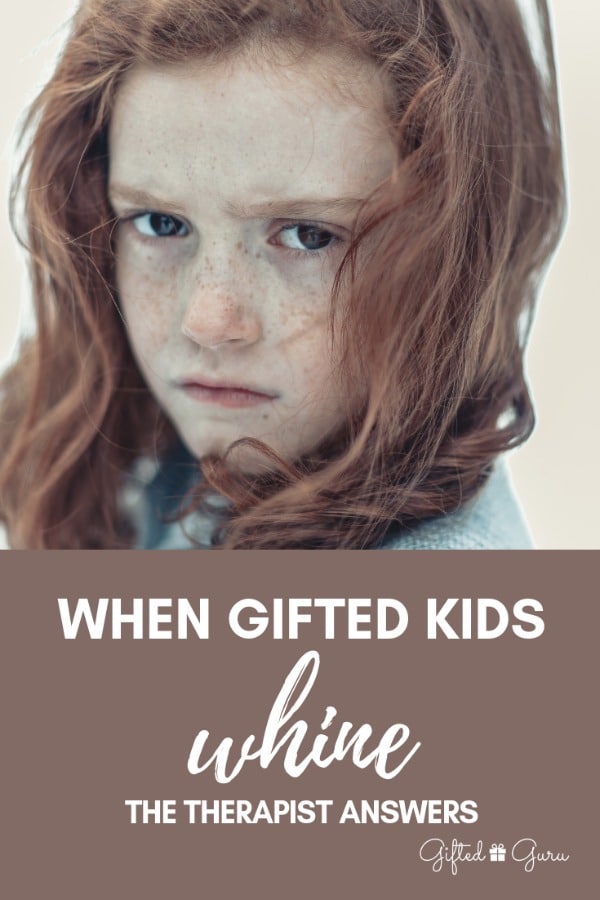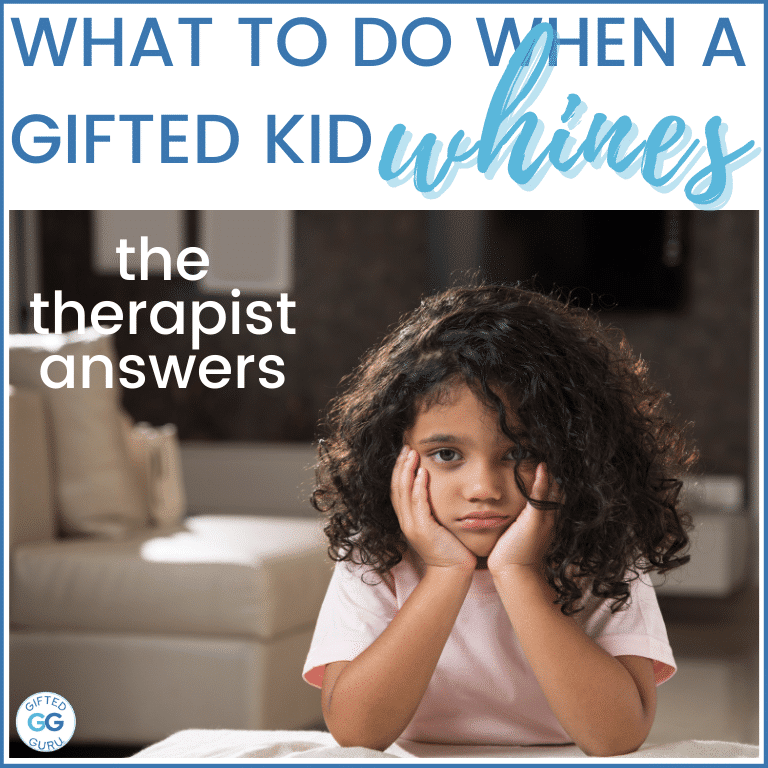When I was teaching high school, I kept a can of spray cheese in my classroom, and when kids would whine, I would pull it out and ask, “Would you like some cheese with that whine?”
I had to make a joke of it because listening to whining is no one’s idea of a good time. Am I wrong? I’m not wrong.
A parent wrote back when I sent out my newsletter last month asking about it, and this question needed more expertise than I’ve got. I enlisted the help of my best friend, Patti, who is a therapist specializing in gifted kids and adults.
When Gifted Kids Whine: Reader Q & A
My middle child is a 6 year old boy who has tested as “highly gifted” and attends a school for the highly gifted. He’s a wonderful kiddo! Our biggest struggle with him, though, is whining! In fact, it’s been a consistent issue since he was two years old. It seemed age appropriate when it started, but it hasn’t improved much.
We’ve tried lots of different strategies with him when he whines: redirecting, “Say that again in a calm voice,” consequences, rewards for not whining, role playing appropriate ways to respond to directions he doesn’t like, lots of talk about (and modeling of) gratitude, and probably at least five other things I can’t think of right now. And prayer. Lots and lots of prayer!
Thankfully, he really only whines with family (including grandparents), and it doesn’t seem to be a problem at school.
I know this may not be a gifted issue at all. When he throws himself on the ground and cries, though, I think “emotional intensity”! Our other children don’t have this trouble, and we are at a loss for how to help him grow beyond this.
Note: Frequently I get questions from parents or teachers about their children and students. It’s frustrated me that I don’t have time to write back to everyone, and so I’ve decided to begin a “Reader Q & A” feature on the site. You can find all responses here.
If you have a question about your child, your student, best practices, or anything Giftedesque, shoot me an email or message on Facebook, and we’ll see what we can do!
Addressing Whining
Normally I’m the answerer on these Reader Q & A segments, but this time it’s a little different because I got Patti in on the action.
So, first, my little reminder about why kids whine when everyone around them hates it so much.
Why Kids Whine
- It works. It gets our attention, and even though it’s negative attention, it’s attention. It literally makes our skin crawl. Read the research.
- Whining is a way children express sadness and other emotions like anger. They just aren’t that great at expressing emotions in ways that work for others. Read the research.
- Some kids are just whiny by personality. Sorry. It stinks.
- We may have unwittingly reinforced it in the past and habituated the child into whining. It’s the rare parent who can hold out against it forever.
Is Whining a Gifted Issue?
Me: So, how about Patti? Is it a gifted issue or just a general kid issue? I think it’s hard for parents of gifted kids to know if something is an issue everyone deals with, if it’s special to the gifted, or if it’s a blend. What do you think about whining?
Patti: Yes, it may be a gifted issue – emotional intensity plus asynchronous development.
Me: I can see that that blend would be problematic. They’ve got all this emotion, and their emotional development may not match the intensity of the feelings they have. Their ability to manage those feelings may be outpaced by the feelinds. So why is the child not whining at school? Why is he saving all his best stuff for mom and dad?
Patti: It’s common for kids (of all kinds) to be better behaved at school than at home, and it may be that he’s using all his available energy to hold it together while he’s at school or other places and he just doesn’t have any energy left to hold it together when he’s home.
Me: I did write something about that when I interviewed Vidisha Patel. [You can read that here.]
What Parents Can Do To Try To Stop The Whining
Me: Okay, so what do they actually do about it? It sounds like these are really proactive parents trying hard, but nothing’s really working. Fix it, please.
Patti: Gifted or not, here’s what I would explore with the family if I were working with them: The emotions and the behavior are communicating something, and there is some need that is not being fulfilled.
What is the emotion communicating? (What the parent calls “whining” actually sounds like “tantrumming” to me.)
Often with kids we talk about “big feelings.” As in, “It looks like you’re having some big feelings right now! Can you name the feelings?”
It’s amazing how much it helps to just say the words. HE needs to say them – “I’m sad,” or “I’m angry,” or “I’m scared,” or whatever it is.
And then the parent asks, “What do you need?”
A six-year-old may or may not be able to name a need, and it may or may not be reasonable.
If he says, for example, “I need to go to Disneyland!” that doesn’t mean we take him to Disneyland. But we can talk about how it seems like being at Disneyland would really help and he feels like he just needs a break from real life or whatever. But they might be surprised and he might just say something like, “I need a hug.”
Most likely his answer will be something like “I need another bedtime story,” in which case I recommend the method called Collaborative Problem Solving. It’s hard to tell if this applies to their situation or not, but it is worth exploring.
Collaborative Problem Solving
The basic gist of Collaborative Problem Solving is that there is conflict because the adults have one need and the kids have a different need, and if we pay attention to both peoples’ needs there is usually a creative solution.
So in this example the adult might then say, “I see that you need another bedtime story, and I need you to go to sleep now. I wonder how we can meet both of our needs? Do you always need more bedtime stories? Should we start bedtime earlier tomorrow?”
Or maybe another solution would be to adjust the bedtime routine so that the parent reads one bedtime story and the kid is allowed to read one more on his own. Or whatever; you have to get creative. Maybe the question is why do you need another bedtime story? You get the idea. More can be found about that online, if needed.
What if It’s Manipulative?
Me: I have this question: what do they do if the child doesn’t respond to this in the moment? What should they do when the child is whining and talking isn’t stopping it? What if the child is using whining as a manipulation? Gifted kids tend to be master manipulators because of smart + strong verbal skills (no offense, random gifted kid reading this).
Patti: If the child is being manipulative, it’s still because he needs something.
It might be something bigger and harder to define, like he needs to feel in control of his life, or he needs his parents to stop fighting, or he needs people to see him as powerful, or he needs his parents to be more strong in holding boundaries and making him feel safe.
If they’ve walked through what they know, and the problem persists, that’s what professionals are for! So, as always, seek professional help when indicated!
Me: I’m a little frustrated myself because this doesn’t sound like a quick fix, and I’m a big fan of getting stuff solved quickly. However, I can see how this deep dive into what is underlying the neediness will be helpful. I hadn’t really considered it from the angle of what the child is needing as much as what they are demanding. The connection between emotional intensity and asynchronous development is helpful, too. It gives a framework for understanding.
Wrapping Up:
Hopefully these suggestions are helpful. I think they work for a number of behaviors, not just whining. The idea that what we sometimes call whining is really a form of tantruming is helpful, too.
Raising any child is the challenge of a lifetime, and giftedness doesn’t usually make it easier at all. Try the ideas and seek help if you feel like you need more support.
You may also like:
- Friendship 101: Helping Gifted Children Find and Keep Friends (an article Patti & I wrote together)
- Gifted Parenting (an article on the unique challenges of parenting gifted kids)
Would you like to receive my free monthly newsletter? Sign up and receive a free guide for helping gifted children thrive in school.






